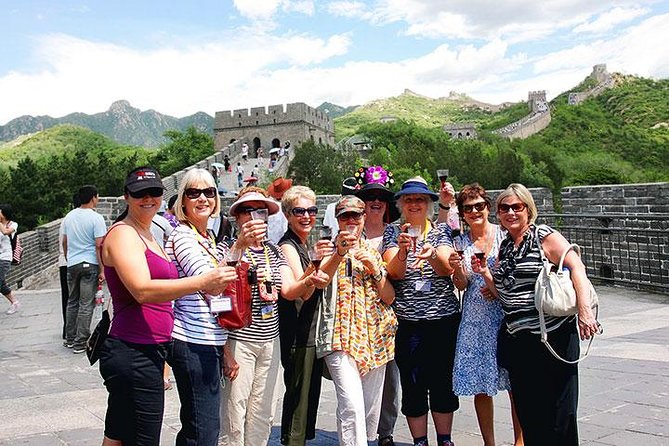1. Designer bags, watches electronic devices and designer clothes are the most counterfeited items. Be extra cautious when buying these items.
Pro: Helps focus your scrutiny on likely copyright products.
Con: May result in suspicion of genuine products without having sufficient information.
2. Research authentic Product Details
Tips: Get familiar with the logo of the company, stitching, material, and other packaging information prior to shopping.
Pro: Enhances your ability to detect subtle differences between genuine fake and authentic products.
Con: Time-intensive, especially when dealing with products that you're not as acquainted with.
3. Trusted Stores
TIP: Buy from authentic brands or reliable malls like Beijing's China World Mall (or Shanghai's Plaza 66) for high-value goods.
Pro: Product authenticity is assured and includes receipts and warranties.
Pro: Some products are more expensive on the marketplace or in smaller shops.
4. Make sure you have checked labels and tags
Beware of spelling errors or fonts that are inconsistent, as well as low-quality packaging.
Pro: A quick method to spot poorly-made counterfeits.
Con: High quality counterfeits can closely mimic the authentic ones, making their the detection of counterfeits difficult.
5. Beware of "too promising to be real" costs
Tipp: Low prices on expensive items ought to be a warning signal. Rarely, expensive items go for prices much lower than retail.
Pro: Stay clear of obvious frauds.
Cons: Some sellers use moderate pricing in order to make counterfeits more convincing.
6. Acquire Certificates of Authenticity
Tips - When purchasing items such as jade (or antiques) or other branded items, or brand new goods make sure you have evidence of authenticity.
Pro: More confidence for your purchase.
Con: Certificates can be faked, which means that this isn't a 100% secure method.
7. Do a test before buying
Request a test prior to purchasing expensive or electronic items.
Pro: Aids in confirming that the device is functional and of high-quality.
Pro: Some sellers might not permit testing, or limit tests to superficial functions.
8. Do not purchase antiques without expert knowledge
Tip - To verify authenticity of antiques you need to have extensive understanding. If you're unsure about their authenticity, avoid them.
Pros: Lowers your risk of being scammed when you purchase a fake.
Con: If you don't check around, you may be missing out on visually appealing, if not authentic, ornamental pieces.
9. Use a Trusted Local Guide
TIP: A local guide familiar with the market can aid in identifying trustworthy vendors.
Benefits: You will cut down on time and the risk of shopping in unfamiliar markets.
Cons: Guides may expect a gratuity or commission which will increase the cost of your trip.
10. You must trust your instincts
Do not buy something if you don't feel natural regardless of the way in which the vendor conducts business or the product's quality.
Pro: Keeps you from regrettable purchases
Con: Over-cautiousness might lead you to overlook genuine deals.
Pros and Cons of Staying Away from copyright Products
Durability - Genuine products will last longer. They are also more economical.
Peace of Mind: No worries about being deceived or scammed.
Legal Safety: Some travel destinations penalize travelers who return goods that are copyright.
Brand Reputation: Genuine products can help maintain the ethical business practices.
Pros and cons of avoiding copyright products
Authentic goods are typically more expensive.
Access to goods is limited. Genuine products may not be readily available in small shops or markets.
Missed bargains: Some counterfeits provide top quality and excellent value at a low price.
These suggestions will allow you to navigate shopping in China with confidence and to make an educated choice regarding whether or not would like to purchase authentic goods. View the top learn the history of this place for site recommendations including the master of nets garden the hall of ten thousand books, binhai aircraft copyright theme park in tianjin, biking tours, shopping in tibet, china built the worlds deepest high speed railway station under the great wall, the color of dress in china, ancient football in china cuju in ancient china, zechawa valley tour route, datong beijing high speed railway schedule and timetable, anren ancient town and more.

Top 10 Tips To Respect Cultural Diversity When Visiting Famous China Temples
1. Tip: Each temple will have their own rituals and rules. Always adhere to local customs. This includes bowing, offering incense, and remaining silent during ceremonies.
Pro: Shows a high regard for the temple's rituals and rituals.
Con: Can be overwhelming if you're unfamiliar with the temple's practices or customs.
2. Dress sensually
Dress in a way that covers the legs, shoulders and arms. Some temples will provide scarfs, shawls, or other coverings to visitors.
Pro: It displays reverence for the sacred place and helps to avoid the locals from being offended.
Con: This can be uncomfortable in hot weather. hot and requires extra clothing.
3. Relax and be calm
Tip: Be quiet and peaceful, especially when you are in prayer halls or in sacred spaces. Be quiet when speaking. Avoid loud conversations.
Pro: Shows respect for worshippers by maintaining the sanctity and purity of the space.
Con: Silence might seem awkward or uncomfortable in busy tourist areas.
4. Avoid Disrupting Worshippers
Don't interrupt those who are meditating or praying. They should be able to finish their prayers or meditation.
Pro: Displays consideration for the religious practices of others.
Con: You may feel you're tempted to interact with other worshipers, but it's important to keep your distance from distractions.
5. Do not Touch Sacred Objects
Be careful not to touch statues or sacred objects unless specific permission is given. These objects are often considered highly sacred.
Pro: Respects culture and the sacredness of the temple.
Con: It could be tempting to get your hands on things in the hopes of taking photographs or simply to be curious.
6. Don't Disrespect the Elders
Tips. In many temples the elderly members of society are considered to be revered. Be courteous and show deference when interacting.
Pro: Respects the value of culture of respecting elders.
Cons: It could be difficult to understand if it's not your first language.
7. Follow the lead of locals
Tip : If you don't know how to act in a specific situation, follow the locals' model.
Pro: You'll fit seamlessly and be sure that you are following the correct procedures without any mistakes.
Cons: It might require some time to watch the procedures and comprehend them.
8. Request Permission Prior to Photographing
Be sure to ask permission before taking pictures in any location and especially in places which are populated by people praying. Some temples may prohibit photography entirely.
Pro: Represents respect for privacy of others and the sanctity of the space.
Con: Missing opportunities to take photos could be a major issue particularly in areas that have stunning sceneries.
9. Don't be afraid of making modest and respectful offerings
Simple and modest offerings are best if you are planning to make an offer (such as incense, flowers or fruits). If you're not obliged to give extravagant gifts, then don't.
Pro: Aligns local customs.
Cons: If you don't have local advice you might be confused about the most effective options.
10. Pay attention to your actions and your language
Maintain a calm and respectful manner at all times. Beware of inappropriate language and jokes around sacred sites.
Pro: Creates an atmosphere of peace and respect for all worshippers and visitors.
Con: Often, the use of humor or a relaxed manner of communicating is the best strategy, but it is important to maintain your composure.
Chinese temples are a wonderful location to show respect to the culture
Positive Relationships with Locals Respecting the culture of your neighbors will help you form positive relationships.
Displays a desire to cultivate an understanding of culture and a deeper immersion into Chinese customs.
A memorable experience can be built by respecting temple culture.
Beware of Mistakes: By adhering to traditional practices of the culture, you can avoid disrespecting sacred spaces or people, ensuring that your visit is more pleasant.
Increased Spiritual Sensitivity. Respecting the culture and spiritual practices of a particular region will give you a better knowledge of them.
Cons of cultural respect in Chinese temples
Cultural Misunderstandings - Without prior knowledge you could make a mistake, or misunderstand temple protocol and cause discomfort.
Dressing modestly or following the rules of dress in hot temperatures could result in discomfort.
In the absence of strict rules, you might feel restricted in how you are able to experience the temple (e.g. the absence of photography, or speaking).
Time-consuming : Watching temple rituals and learning customs may require more time. Your general schedule of sightseeing could be affected.
Language Barriers. It can be challenging to comprehend rituals and request permission when there's some language barrier.
If you follow these guidelines and showing respect for the culture, not only will you enjoy a more enjoyable satisfaction and experience, but you'll also help preserve the sacredness and tradition of these ancient places. View the recommended discover this natural wonder for website advice including weaponry of iron age iron cannon iron armour and warships, temple of confucius one of the three largest ancient architectural complexes, lion forest garden suzhou classical garden, shanghais winter wonderland festivals lights and fun, shopping in nanjing, chinese knot which has a long history and a symbolic meaning, chinese knot which has a long history and a symbolic meaning, great tang all day mall xian.html, xiamen, luoyang peony and wangcheng park and more.
